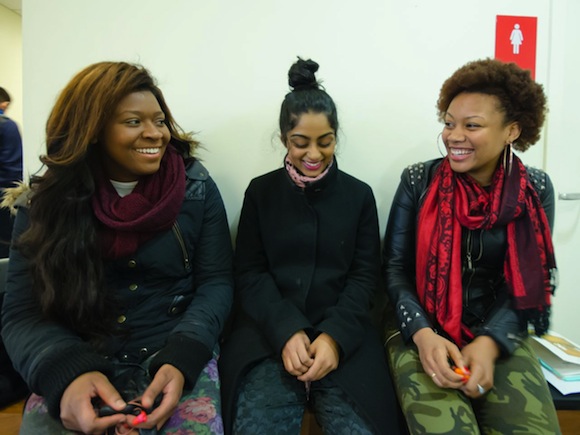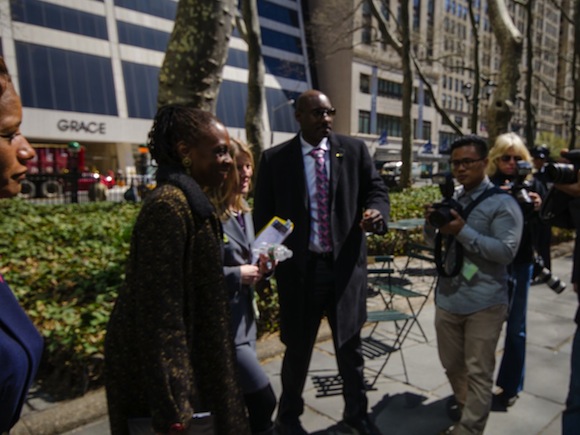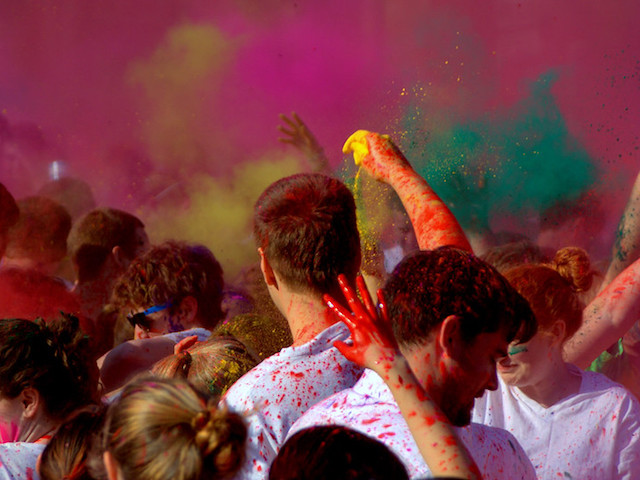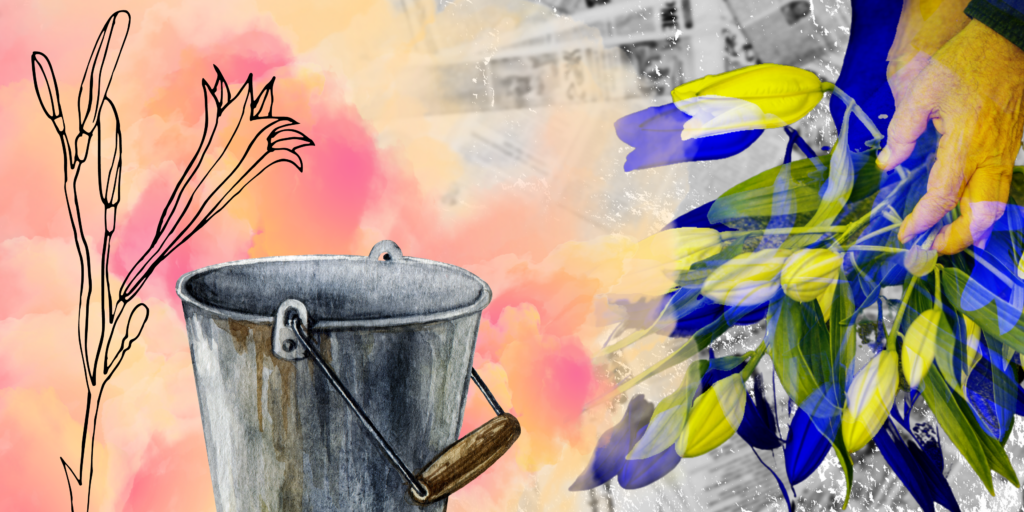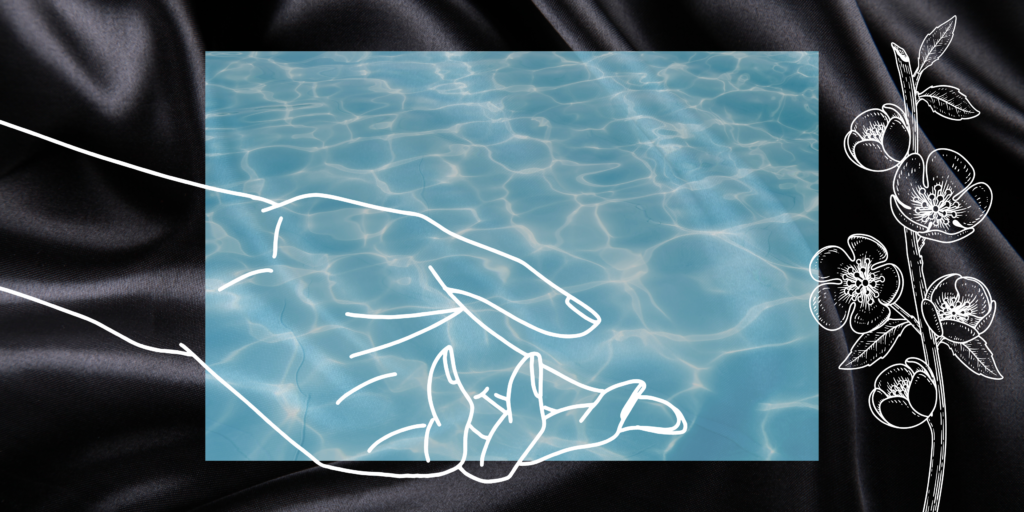When poet and First Lady Chirlane McCray (aka “FLONYC”) chose spoken word artist Ramya Ramana to perform at her husband’s inauguration, it took the ceremony—and Ramya’s poetry—to a whole new level.
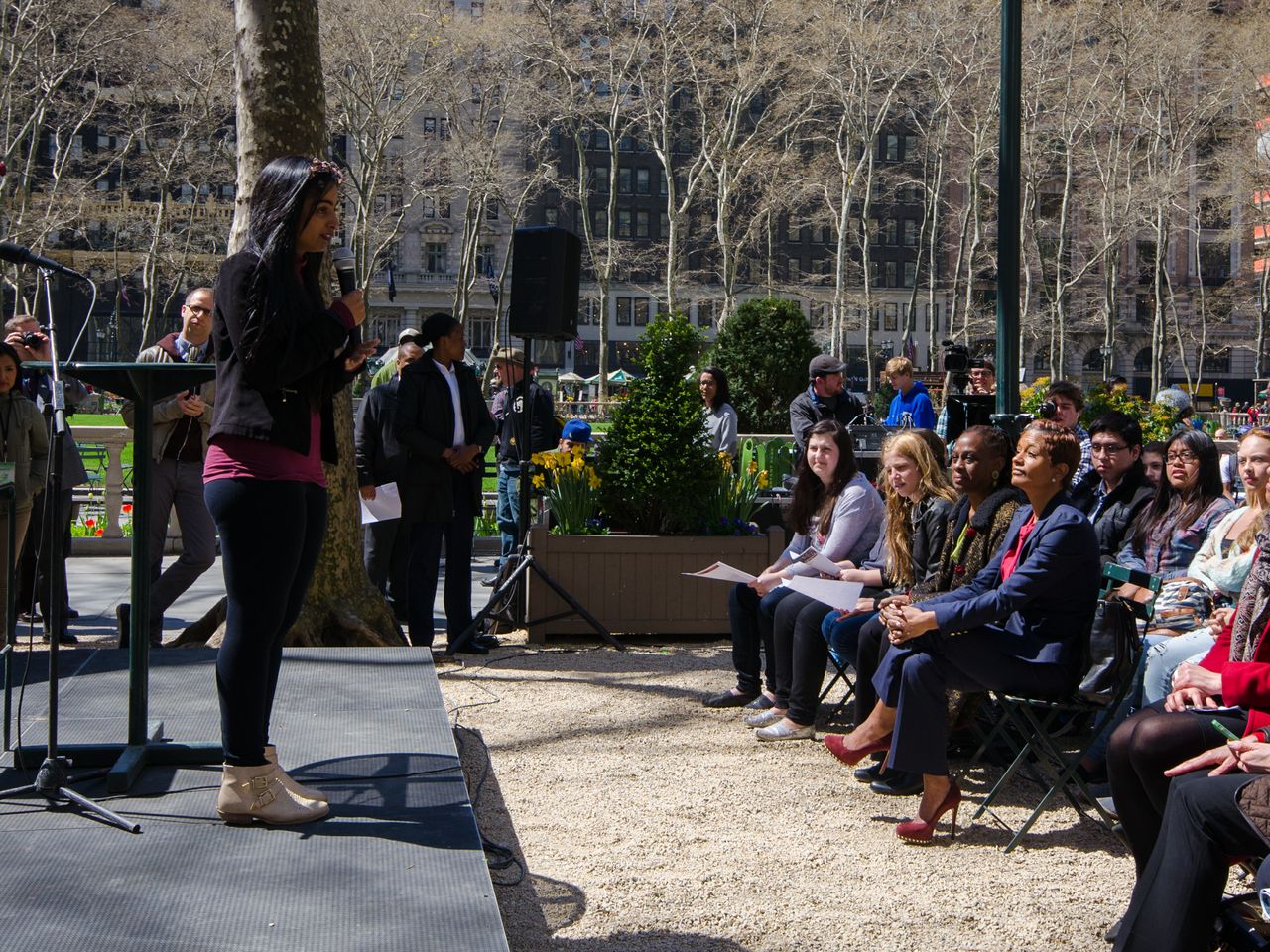
May 7, 2014
It seemed a routine morning for Ramya Ramana. Reporters milled around an outdoor stage and a security detail positioned itself to receive soon-to-arrive local dignitaries. Still, not a tremor of nervous energy from the St. John’s University freshman as she prepared to open for New York’s annual “Poem in Your Pocket Day” in Bryant Park. Then a troop of young school children, bundled lightly against the late-April chill, filed in.
Ramana twisted briefly in her seat to look at the growing audience and asked a friend, “Wait, so which poem should I do?”
She wondered whether “Ms. America”—a blazing indictment of the racist backlash against Nina Davuluri’s recent beauty pageant victory—was a little too heavy for young ears. That was not, however, the only cause for her sudden worry.
“If I don’t do ‘Ms. America,’ then I’ll have to do ‘Royalty’ now and tonight!”
“So?” her friend asked.
“So, I can’t read that twice in front of Chirlane!”
Chirlane McCray, the First Lady of New York City, was scheduled not only to attend this event, but an event later that evening at the Tribeca Film Festival. Ramana would be opening for her at both venues.
“I mean, I can say ‘Chirlane’ cause she and I are like best friends,” she chuckled. Still giggling, she quickly apologized for taking liberties with the First Lady’s name.
I don’t think I chose poetry. I think it was what I needed. This was my tool for survival.
It’s easy to understand why Ramana feels so close to the First Lady of New York. Her selection as the city’s Youth Poet Laureate last year had elevated her profile, but Ms. McCray’s decision to have her perform at the mayoral inauguration took things to a new level for Ramana. Since January, the young poet’s schedule has been jam-packed. She’s performed at a hundred gigs or so just this year.
And, the DeBlasios have always welcomed her and her art warmly.
Recalling her brief January encounter with them, she beamed, wistfully, “They’re so nice and genuine. All of them.”
***
Ramya Ramana first met the DeBlasios just a few months ago, on New Year’s Day, when the morning air was even crisper. The polar vortex had frozen sidewalks and darkened even the dark of winter.
Wrapped in a heavy black overcoat, she waited until her name was called and took the stage outside City Hall behind a podium gilded with the city’s seal.
She ferociously recited “We Will No Longer Stay Silent to This Classism,” an uncompromising call for New Yorkers to break their silence on citywide inequality, recession-era policies, and gentrification. It was likely a first for the mayoral ceremony on many levels: the first time the notion of “classism” was such an explicit theme; the first time a spoken word artist was featured; the first time for a woman of color, a Flushing-born Indian American, and a youth poet to seize such a key moment in the political spotlight.
It suited the 109th mayor with a multi-racial family, who came into office amidst widespread unrest with the city’s growing economic disparity. (As of this year, the top 20% of New York City earners accounted for over 53% of the city’s income, and the bottom 40% only claimed about 11%.) This was the “Tale of Two Cities” that Mayor De Blasio vowed to make the focus of his work, and Ramana was there to wake the audience into a conscious meditation on this mission.
Then she took take them to church.
“And the congregation says,” she shouted, rolling her palms upward at the close of her poem. The crowd punctuated her call with “Amen!” and surged with infectious applause.
***
“I wanted the message to be for the people, so I felt connected when I got up there,” Ramya reflected during a recent conversation at the Asian American Writers’ Workshop.
Perhaps concern for the struggles of the underprivileged was the quality that drew Chirlane McCray to Ramya Ramana. Undoubtedly, the First Lady reviewed some of the poet’s socially conscious work before choosing her to participate in the ceremony.
“I think people of color don’t have equal economic opportunity,” Ramana said, discussing the issues that inspire her writing.
She offered her father, a business man, as an example: “He’s always [his work] internationally, because he’s had no success within America, simply because he’s a person of color and nobody wants to buy from him.”
Mr. Ramana had to travel abroad extensively to build his business. He did alright for himself and the family, but not without considerable sacrifice.
“It’s unfortunate. I was talking to him about this the other day and he said to me, ‘the system in America wasn’t made for people of color to succeed,’” she mused.
Her father isn’t the only one in the family who faced racial barriers. When they moved from Flushing to Coram and later to Stony Brook—small towns on Long Island—the family was optimistic that the strong local education systems would offer the two Ramana daughters the best opportunities available. Of course, a move to the suburbs involved a tradeoff: their daughters would be among only a handful of minority students in their classes.
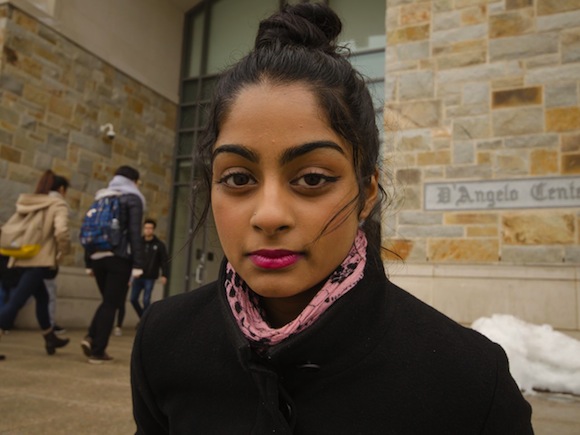 Before entering college, Ramya faced years of vicious racial bullying from classmates at her school on Long Island.
Before entering college, Ramya faced years of vicious racial bullying from classmates at her school on Long Island.
“You know how on the Wii you can make pictures?” Ramya asked, leading into a more personal revelation.
In middle school, Ramya once recorded herself singing opera—an endeavor into silliness that she admits revealed her “tone-deafness.” A friend with whom she entrusted the recording made a copy and then forwarded it to other students at her middle school.
After that, everything unraveled. Students at her school constructed an avatar of Ramya on a Nintendo Wii. The character was dark-skinned, had a unibrow and a dot on its forehead. They paired the image with the recording of her singing and sent it around as a chain text message.
“The message said, ‘if you don’t want to look or sound like this, forward this message along to fifteen people,’” Ramya recalled, shaking her head. “I walked through the school the next day and everyone was playing this message.”
Things didn’t improve in high school. Classmates—many from the same junior high—started a “Ramya club” dedicated to making her life miserable. They took photos from her Facebook account, animated them into .gifs, and then posted them online to embarrass her. “It was really intense,” Ramana recalled.
It was a level of racial harassment that warranted intervention under any legal standard. Yet for Ramya and her family—overwhelmed by the circumstances and uninformed of the proper recourse—there would be no such respite. She eventually left the school when the daily abuse became too much.
***
She’s at a very different place now—emotionally and physically. At St. John’s, she’s enjoying a whirlwind of success: selected to join Urban Word NYC; then awarded the prestigious NYC Youth Poet Laureate title by the city’s Campaign Finance Board; and finally, bestowed a scholarship from the New York Knicks Poetry Slam competition.
“I don’t think I chose poetry. I think it was what I needed. This was my tool for survival.”
At her lowest point, Ramya discovered the source of her lyrical gifts. She had what she can now describe only as a “crazy supernatural experience” with the divine, with God. She then underwent a conversion to Christianity that baffled her mostly Hindu family, but proved critical to her healing and growth.
“I’m really really close with God, and so because of that, I was really able to battle with all of this hate and hurt in my heart. Cause, you know, hurt people hurt people,” she said. For Ramya, her faith prescribes mercy and understanding, but she’s also able to reflect intellectually on her classmates’ actions and choices.
“Yes, I can forgive them, but I still have to acknowledge that what they said is racist and the system still has to be fought against.”
That sentiment must resonate strongly with Ms. McCray, who was also the target of racial bullying by white classmates in middle school. “I had never had a deep sense of belonging anywhere,” she told the NY Times last year. “I always felt I was an outsider.” Ms. McCray took to writing poetry—angry poetry—to cope with the stress.
***
Ramya has also taken to furious verse as a result of her experiences with racism. Once, admittedly, a doe-eyed Telugu girl drawn to poetry through the entrancing romantic lyrics of A.R. Rahman’s music, she now writes staccatoed free verses about the dissonance of wealth and injustice in American society.
“I want to be an artist and activist. I want to write and work for those that are underprivileged,” she explained.
In addition to the events she attends for the Campaign Finance Board, she was featured at the V-Day “1 Billion Rising” event in February, sharing a stage with its founder, Eve Ensler. She even completed a solo show at Joe’s Pub just a few weeks ago. She’s developing a portfolio of performances that take her off campus quite often, to places like the Nuyorican Poets Café and other well-trodden stops for the spoken word, hip-hop, and poetry set. It has made for a first-year college experience that’s a bit out of the ordinary.
Still, Ramya believes she has much to learn. Her mother still dutifully calls to check what, when, and how often Ramya’s eaten, and she still gets nervous when her name is called on stage.
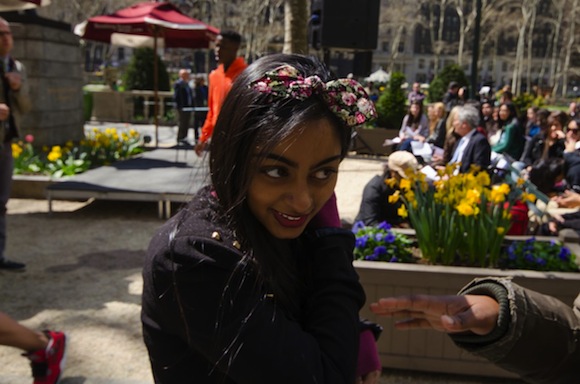 Ramya awaits the arrival of First Lady Chirlane McCray.
Ramya awaits the arrival of First Lady Chirlane McCray.
So when Ms. McCray finally arrived at Bryant Park for Poem in Your Pocket Day, it was no surprise to see Ramya sheepishly grab her own hair while craning to see the FLONYC’s entourage. No, she wouldn’t dare to call Chirlane out by name. Everything is still fresh for Ramya, maybe even overwhelming at moments.
On stage, though, is another matter.
With the FLONYC in the front row, Ramya brought her eyes and the eyes of the audience to a wet stillness, exuding the emotional urgency of a veteran artist in her performance of “It’s Not Your Problem.” The rendition prompted one onlooker to approach her afterwards and ask incredulously how she could summon such genuine feeling for every performance.
Then, FLONYC—aka “Flow Nice”—followed her on stage to perform some of her own poetry. She shared stories of an awkward time when, as young woman, she was unsure of her writing and took a risk by submitting a bunch of her poems to a literary journal. They published an entire set.
Afterwards, Ramya and the FLONYC took a photo, exchanged pleasantries and planned to see each other later that night. They also had this exchange on social media:
.@Ramyaramana, YOU are awesome! And your poetry ROCKS! http://t.co/Q7uzEDPRdD
— Chirlane McCray (@Chirlane) April 24, 2014
Best friends? Maybe not yet. But good ones, and kindred spirits of poetry.

